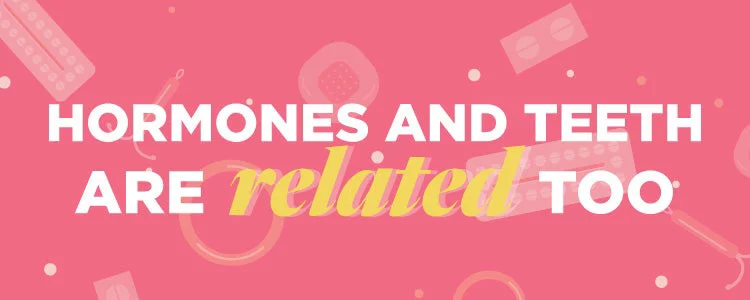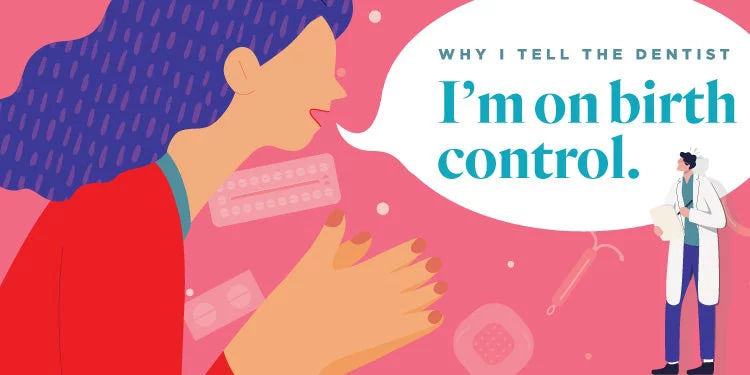The Different Types of Birth Control
Hormonal Birth Control
Non-Hormonal Birth Control

Hormonal Imbalance Side Effects
- Slow or rapid heartbeats
- Unexplained weight gain or loss
- Feeling tired
- Constipation, diarrhea, or an increase in bowel movements
- Numbness or tingling in your hands
- High cholesterol
- Depression or anxiety
- Temperature sensitivity
- Dry hair or skin
- Irregular body fat distribution
- Darkened skin or skin tags
- Extreme thirst and overactive bladder
- Acne
- Hair loss
- Heavy periods
- Excess body hair
- Hot flashes
- Infertility
- Irregular periods
- Loss of sex drive
- Vaginal dryness
- Vaginal atrophy
What Are the Side Effects of Birth Control on Oral Health?
Receding Gums: When the gum tissue is infected, it pulls back from the teeth and wears away, exposing more of the tooth or the tooth's root.

Changing Hormones Effect on Oral Health
Another Important Reason to Tell Your Dentist about Your Birth Control
Find a Dentist Near You
For more information or to find a Smile Generation-trusted dentist near you use our Find a Dentist Tool.
Find your trusted, local dentist today!
Sources
[1] https://www.webmd.com/sex/birth-control/hormonal-methods-of-birth-control-directory?catid=1006
[2] https://www.webmd.com/sex/birth-control/birth-control-pills
[3] https://www.webmd.com/sex/birth-control/birth-control-depo-provera
[4] https://www.webmd.com/sex/birth-control/vaginal-ring-birth-control
[5] https://www.webmd.com/sex/birth-control/iud-intrauterine-device
[6] https://www.webmd.com/sex/birth-control/birth-control-transdermal-patches
[7] https://www.webmd.com/sex/birth-control/birth-control-implants-types-safety-side-effects
[8] https://my.clevelandclinic.org/health/diseases/22673-hormonal-imbalance
[9] https://my.clevelandclinic.org/health/diseases/22673-hormonal-imbalance
[10] https://my.clevelandclinic.org/health/diseases/22673-hormonal-imbalance
[11] https://my.clevelandclinic.org/health/articles/11192-hormones-and-oral-health
[12] https://www.colgate.com/en-us/oral-health/adult-oral-care/birth-control-side-effects-oral-health
[13] Taichman LS, Sohn W, Kolenic G, Sowers M. Depot medroxyprogesterone acetate use and periodontal health in 15- to 44-year-old US females. J Periodontol. 2012;83(8):1008-1017. doi:10.1902/jop.2012.110534
[14] Dutt P, Chaudhary S, Kumar P. Oral health and menopause: a comprehensive review on current knowledge and associated dental management. Ann Med Health Sci Res. 2013;3(3):320-323. doi:10.4103/2141-9248.117926
[15] https://my.clevelandclinic.org/health/articles/11192-hormones-and-oral-health
[16] https://my.clevelandclinic.org/health/articles/11192-hormones-and-oral-health
[17] https://my.clevelandclinic.org/health/articles/11192-hormones-and-oral-health
Smile Generation blog articles are reviewed by a licensed dental professional before publishing. However, we present this information for educational purposes only with the intent to promote readers’ understanding of oral health and oral healthcare treatment options and technology. We do not intend for our blog content to substitute for professional dental care and clinical advice, diagnosis, or treatment planning provided by a licensed dental professional. Smile Generation always recommends seeking the advice of a dentist, physician, or other licensed healthcare professional for a dental or medical condition or treatment.








